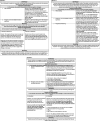More than a feeling: emotional regulation strategies for simulation-based education
- PMID: 39736707
- PMCID: PMC11687166
- DOI: 10.1186/s41077-024-00325-z
More than a feeling: emotional regulation strategies for simulation-based education
Abstract
Simulation-based education often involves learners or teams attempting to manage situations at the limits of their abilities. As a result, it can elicit emotional reactions in participants. These emotions are not good or bad, they simply are. Their value at any given moment is determined by their utility in meeting the goals of a particular situation. When emotions are particularly intense, or a given emotion is not aligned with the situation, they can impede learners' ability to engage in a simulation activity or debriefing session, as well as their ability to retain knowledge and skills learned during the session. Building on existing guidance for simulation educators seeking to optimize the learning state/readiness in learners, this paper explores the theory and research that underpins the practical application of how to recognize and support learners' emotions during simulation sessions. Specifically, we describe the impact of various emotions on the cognitive processes involved in learning and performance, to inform practical guidance for simulation practitioners: (1) how to recognize and identify emotions experienced by others, (2) how to determine whether those emotional reactions are problematic or helpful for a given situation, and (3) how to mitigate unhelpful emotional reactions and leverage those that are beneficial in achieving the goals of a simulation session.
Keywords: Emotion; Interpersonal emotional regulation.
© 2024. The Author(s).
Conflict of interest statement
Declarations. Ethics approval and consent to participate: Not applicable. Consent for publication: Not applicable. Competing interests: Victoria Brazil is a senior editor for Advances in Simulation.
Figures
Similar articles
-
Student and educator experiences of maternal-child simulation-based learning: a systematic review of qualitative evidence protocol.JBI Database System Rev Implement Rep. 2015 Jan;13(1):14-26. doi: 10.11124/jbisrir-2015-1694. JBI Database System Rev Implement Rep. 2015. PMID: 26447004
-
Unpacking the Emotional Experiences of Learners in a Blended Learning Context.Front Psychol. 2022 May 25;13:879696. doi: 10.3389/fpsyg.2022.879696. eCollection 2022. Front Psychol. 2022. PMID: 35693530 Free PMC article.
-
'A roller coaster of emotions': a phenomenological study on medical students lived experiences of emotions in complex simulation.Adv Simul (Lond). 2021 Jul 3;6(1):24. doi: 10.1186/s41077-021-00177-x. Adv Simul (Lond). 2021. PMID: 34217370 Free PMC article.
-
Simulation Training in Psychiatry for Medical Education: A Review.Front Psychiatry. 2021 May 21;12:658967. doi: 10.3389/fpsyt.2021.658967. eCollection 2021. Front Psychiatry. 2021. PMID: 34093275 Free PMC article. Review.
-
Emotions in simulation-based education: friends or foes of learning?Adv Simul (Lond). 2022 Jan 20;7(1):3. doi: 10.1186/s41077-021-00198-6. Adv Simul (Lond). 2022. PMID: 35057864 Free PMC article. Review.
References
-
- Eppich, Walter MD, MEd; Cheng, Adam MD, FRCPC, FAAP. Promoting Excellence and Reflective Learning in Simulation (PEARLS): development and rationale for a blended approach to health care simulation debriefing. SIMULATION IN HEALTHCARE: The Journal of the Society for Simulation in Healthcare 10(2):p 106–115, April 2015. | 10.1097/SIH.0000000000000072 - PubMed
-
- Grant VJ, Robinson T, Catena H, Eppich W, Cheng A. Difficult debriefing situations: A toolbox for simulation educators. Med Teach. 2018;40(7):703–12. - PubMed
-
- Rudolph JW, Raemer DB, Simon R. Establishing a safe container for learning in simulation: the role of the presimulation briefing. Simulation in Healthcare. 2014;9(6):339–49. - PubMed
LinkOut - more resources
Full Text Sources
Research Materials




